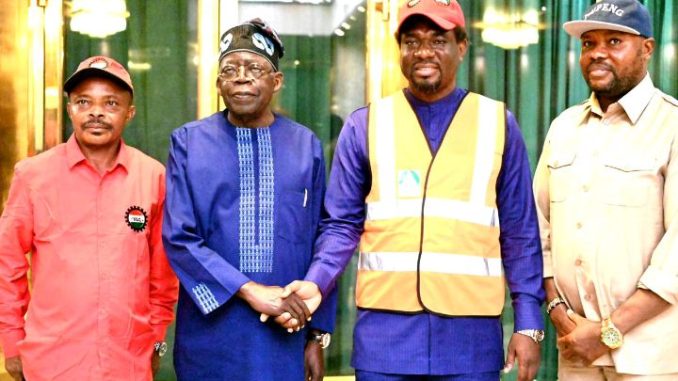
By Obinna Ejianya (9News Nigeria – Melbourne, Australia)
Reactions have trailed President Bola Ahmed Tinubu’s approval of 70,000 Naira Minimum Wage after his meeting with the Labour Union leaders.
In a move that has sparked widespread reactions across Nigeria, President Bola Ahmed Tinubu has approved a new minimum wage of 70,000 Naira ($43 USD) for federal workers, following a meeting with Labour Union leaders. The decision, which more than doubles the previous minimum wage of 30,000 Naira ($18 USD), has elicited a range of responses from Nigerians, with some welcoming the increase while others express concerns about its potential impact on the economy.
The announcement was made by the President’s media adviser, Bayo Onanuga, who stated that Tinubu had agreed to the new minimum wage and promised to review the national minimum wage law every three years. [1] This decision comes after months of negotiations between the government and labour unions, who had initially demanded a minimum wage of 250,000 Naira ($153 USD).
In a meeting with union leaders, President Tinubu acknowledged the economic challenges faced by Nigerians and the need to provide urgent relief. “We are in the same economy. We are in the same country. We may have different rooms, different addresses, and different houses; we are just members of one family that must care for each other,” he said.
The President’s decision to increase the minimum wage has been praised by labour leaders, who have expressed their appreciation for his commitment to the welfare of Nigerian workers. Joe Ajaero, the president of the Nigeria Labour Congress (NLC), stated that while he had “mixed feelings” due to the state of the economy, the unions had accepted the offer because of the “other goodies” attached to it, such as the promise of a review every three years.
Festus Usifo, the president of the Trade Union Congress (TUC), also welcomed the decision, saying that the three-year review period was a significant improvement from the previous five-year cycle.
However, not all Nigerians are convinced that the new minimum wage is sufficient to address the country’s cost of living crisis. Charles, a 53-year-old government administration worker in Abuja, expressed his concerns, stating that the increase is “unrealistic” and that he is worried about his ability to feed his family. “One bag of rice won’t last more than four weeks and it costs me 86,000 naira. It’s horrible,” he said.
Financial analyst Victor Aluyi also raised concerns about the potential impact of the new minimum wage on inflation and the government’s ability to find the necessary funds to pay it. “Dis na like minimum wage right? What of pesin wey dey level 10 for example, wetin be di adjustment? So, e no clear to say na di same adjustment wey you get from 30 to 70k, na im you go get across. I no sure say dat na wetin go happun,” he said.
Aluyi also warned that the new minimum wage could lead to more inflation, although he believes it may not be as significant as the inflation the economy is already experiencing. “Di possibility say e go cause inflation dey dia, however, we already dey face inflation. So, I no sure how significant di new minimum wage go be on inflation,” he said.
The government’s decision to increase the minimum wage has also sparked reactions on social media, with Nigerians expressing a range of opinions. Some users praised the President’s move, with one Twitter user @NigeriaNewsHub tweeting, “This is a welcome development. President Tinubu has shown his commitment to the welfare of Nigerian workers.”
However, others expressed skepticism about the impact of the new minimum wage, with @EconomicAnalyst tweeting, “While the increase in minimum wage is a positive step, the government needs to address the underlying economic challenges that are driving up the cost of living. This alone may not be enough to alleviate the hardship faced by many Nigerians.”
The approval of the 70,000 Naira minimum wage is a significant development in Nigeria’s ongoing efforts to address the country’s economic challenges. As Nigerians continue to grapple with rising inflation and the cost of living, the government’s response will be closely watched and scrutinized by the public.
By Obinna Ejianya (9News Nigeria – Melbourne, Australia)
THE ROTTEN FISH: CAN OF WORMS OPENED OF APC & TINUBU'S GOVERNMENT OVER NIGERIA'S ECONOMIC DOWNTURN
WATCH THE CRITICAL ANALYSIS AND KNOW THE RESPONSIBLE PARTIES TO BLAME FOR NIGERIA'S ECONOMIC CHALLENGES, WHILE CITIZENS ENDURE SEVERE HARDSHIPS.Watch this episode of ISSUES IN THE NEWS on 9News Nigeria featuring Peter Obi's Special Adviser, Dr Katch Ononuju, 9News Nigeria Publisher, Obinna Ejianya and Tinubu Support Group Leader, McHezekiah Eherechi
The economic crisis and hardship in Nigeria are parts of the discussion.
Watch, leave your comments, and share to create more awareness on this issue.
#9NewsNigeria #Nigeria #issuesInTheNews #politics #tinubu THE ROTTEN FISH: CAN OF WORMS OPENED ...
DON'T FORGET TO SUBSCRIBE AND LEAVE YOUR COMMENTS FOR SUBSEQUENT UPDATES
#9newsnigeria #economia #economy #nigeria #government @9newsng
www.9newsng.com
